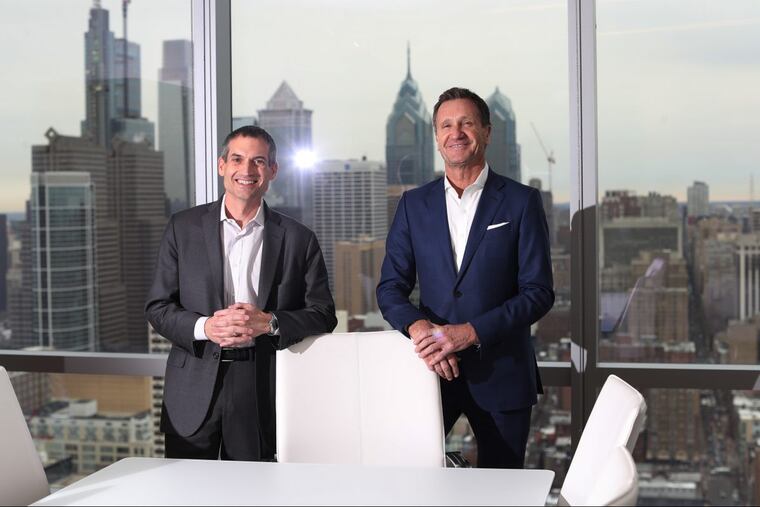Two FMC Corp. companies will soon dominate the UCity skyline
"Two leading companies, each in their space." After they split, one FMC will sell bug-killers to farmers. The other will dig and process lithium for smartphones, electric cars - and antidepressants

In the Apple store on Walnut Street, Melissa Brondeau's notepad with the red FMC logo caught the Genius' eye.
"My God, FMC!" he told her. "I see that tower every day. It's so beautiful. Do you work there?"
Her husband, Pierre Brondeau, is FMC Corp.'s chief executive. As the 49-story tower's biggest tenant, Brondeau got to wire FMC's glowing logo to the top — raising his company's hometown profile high above 2929 Walnut St., and dominating the road and rail traffic binding Center City, the airport, and the colleges/hospitals complex along the Schuylkill. [Update: On Dec. 22 the state RACP program gave FMC $2 million in matching state funds for its move from Center City to the tower. See item 300 on the grant list linked to this page.]
Soon, FMC will be two. Brondeau has morphed the onetime food-machinery company from a collection of mining and chemical commodities units into a pair of soon-to-be-independent multibillion-dollar corporations. One will be among the five giant farm-pesticide makers that own enough science to develop competitive molecules for global markets, as approved by the European Commission; the other will be one of the planet's top miners and processors of lithium, which is in growing demand for electric-car and smartphone batteries. (It's also an antidepressant, and useful in bulletproofing.)
Expectations for FMC are high. The stock topped $95 for the first time last week, 35 times the current fiscal year's projected per-share earnings, and nearly 40 times last year's. That's a lot higher than rivals DowDupont, which includes the former Wilmington-based DuPont Co.; Bayer, which is taking over Monsanto; and BASF, and is in a league with Switzerland-based Syngenta, whose high price reflects a takeover premium as it prepares to be acquired by ChemChina.
Lithium demand for the batteries powering digital industry is soaring, Goldman Sachs analyst Robert Koort noted during FMC's fall investor conference call. But farm demand worldwide has been slow in recent years, noted Don Carson, analyst at Philadelphia-based Susquehanna International Group.
Brondeau, who was busy shaving manufacturing costs and shutting aging plants before doing a deal with the pre-Dow-merger DuPont, told investors that both FMC companies now stand to boost sales and profits — "two leading companies, each in their space. There is absolutely no commonality between these businesses. And there is tension among the shareholders. So we want to break them up," starting with a partial spin-off of the lithium business to investors by fall 2018, then a sale of the rest of the shares in early 2019.
Former DuPont Co. scientists and technicians cheered Brondeau when he visited the Stine Labs near Newark, Del., last month to take formal possession of the pesticide research center. The scientists had feared cost-cutting DuPont CEO Edward Breen would shutter their works, trash their experiments, and consolidate research at former Dow and Pioneer Seed centers in the Midwest after Dow and DuPont merged last summer.
But European regulators, after reviewing my accounts and others' of DuPont layoffs at its Experimental Station in Wilmington ahead of the Dow merger, insisted that DuPont sell part of its pesticide business — and its R&D teams — to a new competitor, to avoid the prospect of a few giant producers squeezing European farmers with higher prices for antiquated pesticides.
"I knew Breen from the old Tyco International board," which Breen chaired, Brondeau recalled. "We discussed the [Dow] merger, and I told him if there were [antitrust] remedies needed, FMC would be a very interested buyer" of DuPont products, patents, and scientists.
The call came the day after Christmas last year: The Europeans wanted a DowDuPont competitor to buy some of their pesticide lines. Brondeau said, "Obviously, yes!" FMC already had farm R&D centers — including one in Ewing Township, near Trenton. That, plus robust European sales, helped convince regulators "we were serious," Brondeau told me. FMC traded cash and its food-additives business (including a Delaware plant) to DuPont for pesticides including its "selective" insecticide molecule Rynaxypyr, plus dozens of products scheduled for production over the next decade.
Unlike DowDuPont or Bayer-Monsanto, Brondeau said, FMC has no plans to develop genetically modified seeds to fit its pesticides. FMC is looking to develop and buy fungicides and other chemicals to round out its lineup, chief financial officer Paul Graves said.
The combined research operation is now headed by a former DuPont research director, Kathleen Shelton. Both the Ewing and Stine labs remain open. Brondeau said Delaware officials have been "very quick and very positive" in offering to help site more FMC work in that state.
Lithium is a hot commodity in global manufacturing markets; its high-value processed forms are in even higher demand. China is a major producer of the raw material; South America's Andean deserts are another. FMC has spent decades cultivating local governments in Argentina, where the pro-business national government of President Mauricio Macri has approved a more than $250 million expansion of FMC's processing plants.
FMC has split its lithium-manufacturing operations among the U.S., China, and other countries. Few people know the entire process; the company hasn't patented a number of steps, preferring to keep its work secret.
Years of engineering development has brought FMC lithium to market just as demand spikes. Brondeau "says I was lucky. I say I was smart," said Tom Schneberger, global business director for FMC Lithium.
I asked if FMC won't move one or both headquarters, once the companies are split.
"Both companies are staying in Philadelphia," Brondeau insisted. They'll be on "different floors" of the new building, that shining landmark on the Schuylkill.